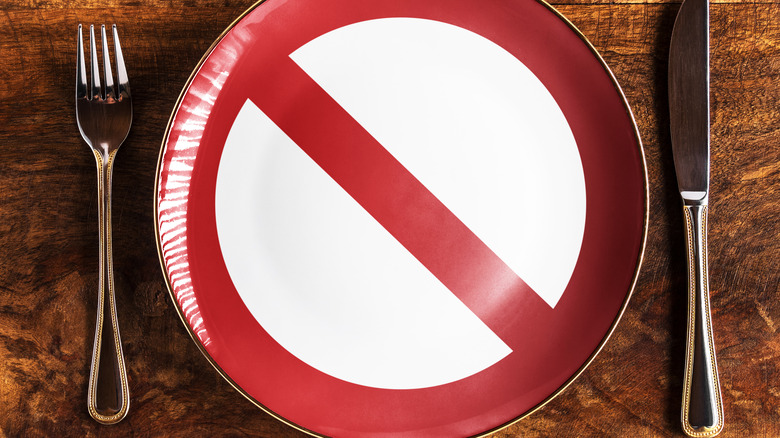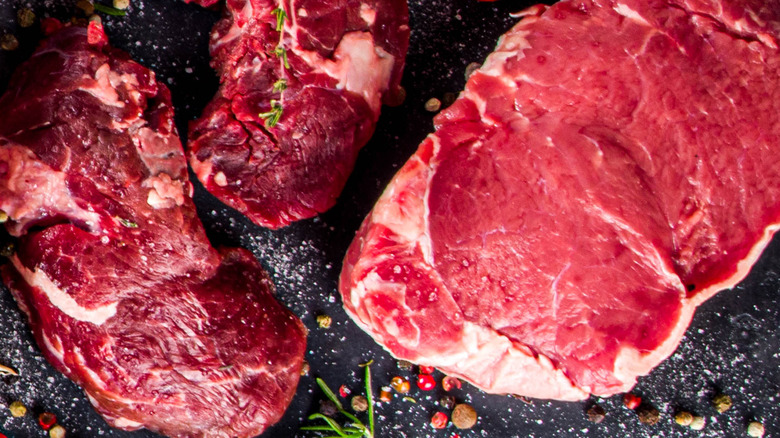The Truth About The Dukan Diet
Some diets make a splash the second they hit the internet. Others stay in the shadows until they're picked up by someone that everyone recognizes, and then they explode in popularity until a new diet comes along. The Dukan diet falls in the second category.
U.S. News has a ranking of all the biggest diet trends. As of 2021, the Dukan diet ranked at #39 overall with a score of only 1.8 out of 5. This might seem too low for a diet rumored to be the reason Kate Middleton (and her mother) lost weight shortly before Kate married William (via Cosmopolitan). And it certainly seems too low for a diet created by a man who, at the time, was a licensed physician in France.
But a closer look at U.S. News' ranking system, and the Dukan diet, reveals the specific — and worrisome — reasons the Dukan diet received such a low rating.
On its surface, the Dukan diet is similar to the ketogenic diet. Both are protein heavy with a strict emphasis on avoiding starches and carbohydrates. Unlike keto, however, the Dukan diet is broken into four phases. The first of these, the Attack phase, is a protein-only phase. If a food doesn't consist almost entirely of protein, then it is not allowed until a later phase. And while this extremely restrictive phase is worrying, it is not the most troubling part of the Dukan diet.
There's no proof it works
In order to rank the Dukan diet, U.S. News went through Dr. Pierre Dukan's book and calculated the calories for the provided recipes. There were no recipes given for the third and fourth phases, known respectively as the Consolidation and Permanent Stabilization phases. Recipes for the first and second phases — the Attack and Cruise phases — were included, however.
They found that the recipes were extremely high in fat and low in carbs – but most worrisome, during these first two phases the average daily calorie allotment is no more than 1,800. Per a table provided by U.S. News, that is 400 fewer calories per day than recommended for women, and about 1,000 fewer calories a day than men require.
Dukan claims his method promotes weight loss due to the nutrient quality of the foods it allows or prohibits. But this quick calorie count reveals that it's just another restriction diet, an approach that has no scientific backing and has, in fact, been linked to long-term health issues.
Serious long-term risks
A 2020 report published in the Journal of the American Society of Nephrology, a society dedicated to all things related to medical treatment of the kidneys, found that long-term high-protein diets are strongly linked to kidney disease later in life. The Dukan diet is meant to be followed lifelong, and even though the initial Attack phase is only supposed to be the first step, there is no time limit assigned to this protein-only phase.
More troubling still, the Mayo Clinic reports that high-protein diets have also been linked to heart conditions. This is specific to high-protein diets using animal protein, since they tend to contain high levels of fat. These diets also tend to lack fiber, which is not only an essential nutrient for digestive function, but also plays a huge role in weight loss.
Dukan's use of calorie restriction, in addition to other ethics issues — such as suggesting high school students should only graduate when under a certain weight (via the BBC) — ultimately led to Dukan losing his medical license (via The Guardian). Despite these controversies, and a lack of scientific research into the diet, some people still bill the Dukan method as medically backed. It is not, and several doctors have spoken out against it, pointing out that its results are likely due to calorie restriction and little else.



